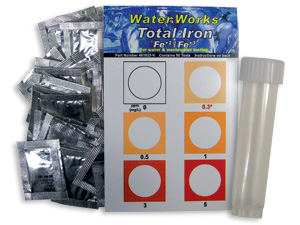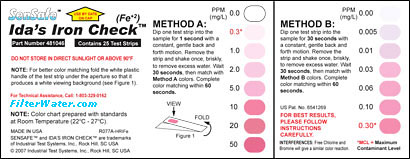Confusion over which water treatment option will work best for a particular application will always exist so if you find yourself somewhat overwhelmed by the huge number of water filters on the market, you find yourself in the company of millions.
Drinking water contaminants and water quality characteristics vary across a water distribution network, from neighborhood to neighborhood — and even from residence to residence depending upon the age of the residence and each residence’s type of plumbing in-home and connecting the home to the public water system.
With that said, today we will address an inquiry sent in by ‘Katherine L’ in Cincinnati who asked the following:
Hi, we just bought our first house (near Cincinnati OH), a long home, with a well. When we first had the water tested while under contract it was during the rainy season in the spring so we were told that having 1 coliform bacteria unit was no unusual. Regardless, we bought a UV for that. We moved in in August and found that a water softener had been used on the house during the testing, so since then we have discovered iron, lot’s of iron and iron bacteria and slippery total solids (please correct that last bit!). We are using bottled water until we figure out which solutions are good for us. There are so many systems out there, we can’t decide what we really need!
First off, it seems as though Katherine has already gone and had her water tested by a certified water testing laboratory — and we think that a very wise move on her part since one must know what contaminants need removing before he or she can make an educated decision regarding a water filtration system.
Iron in drinking water
While not bad enough to make the EPA’s Primary Drinking Water Standards list, iron in drinking water can create a host of problems for people in the form of unwanted staining, unpleasant tasting water, discolored water, and clog forming iron deposits.
One can test for the presence of (ferrous & ferric) iron using a simple total iron test kit which allows users to test for total iron levels between 0.3 and 5.0 mg/L (ppm) in a matter of minutes.
Or, if one suspects a serious amount of dissolved iron in their water, the Ida’s Iron Check made by WaterWorks has the ability to detect concentrations of dissolved iron as high as 50 ppm in a short period of time and without complicated laboratory equipment or specialized training.
OK, so now you know you have iron. How does one get the iron OUT of drinking water?
Easy answer: Filtration.
More realistic answer: “The correct filtration system for one’s unique iron in water concentration.”
Very few situations in drinking water remediation (the correction of water quality issues) have simple solutions and every water quality situation presents a unique challenge. Therefore it stands to reason that not every water treatment system will have what it takes to correct every possible water quality problem.
|
|
Based upon your water test results, carefully read through the specs of various water filtration devices to make certain the unit you select will remove the amount of iron and type of iron present on your water.
Can I use a water softener to remove iron?
Despite what some folks may tell you (while trying to sell you a water softener), you should not attempt to use a water softener as a line of defense against iron in water. The iron will clog the softener and cause the unit to need much more frequent regeneration, backwashing and service visits — all of which wind up costing YOU more money.
For more information on why you should not use a water softener as a filter for iron we suggest taking a look at an earlier article we wrote called Can I Use My Water Softener as an Iron Filter?… and then not use your water softener as an iron filter.
What iron filter would you recommend?
Obviously, since we work closely with both Filter Water and Filters Fast, we suggest beginning your search with either one of those companies.
No matter what filter system you decide on, make SURE it comes with a sediment pre-filter. Otherwise you will find yourself having to backwash your iron filter a lot more often than you’ll enjoy!








